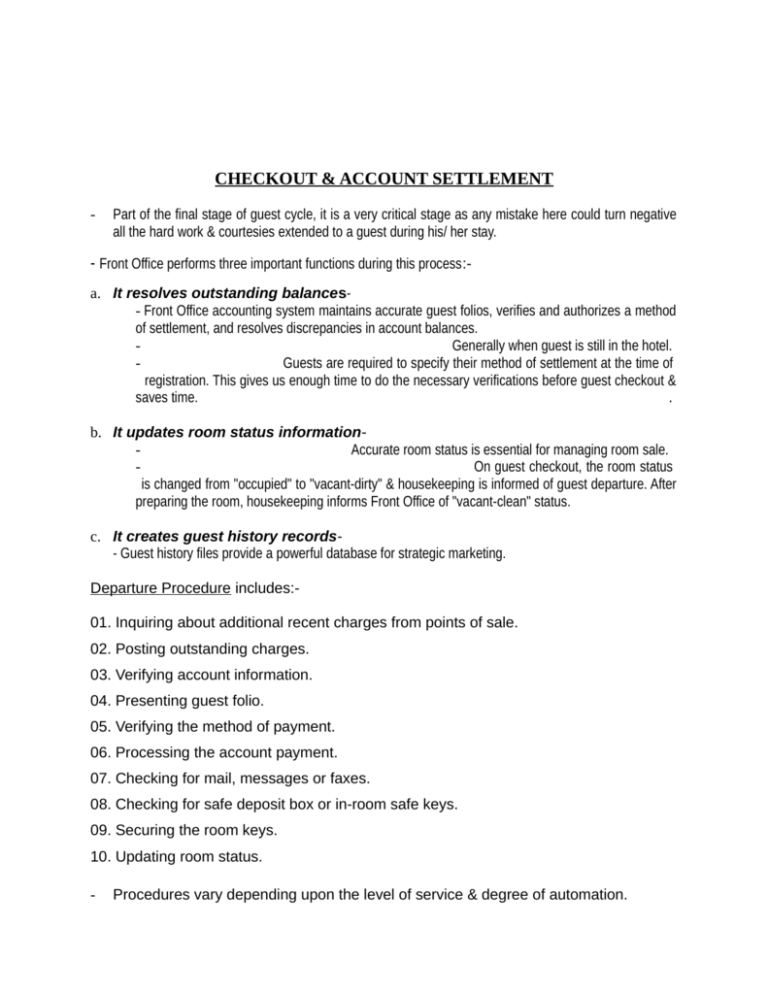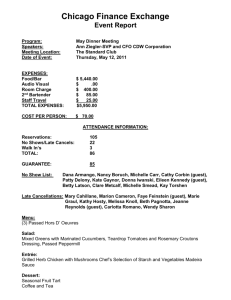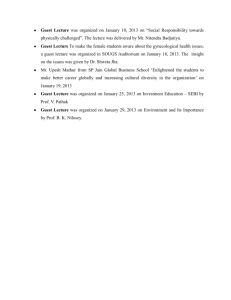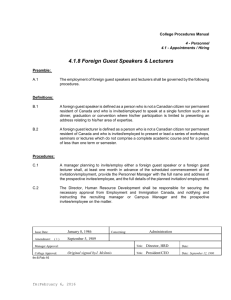checkout & account settlement
advertisement

CHECKOUT & ACCOUNT SETTLEMENT - Part of the final stage of guest cycle, it is a very critical stage as any mistake here could turn negative all the hard work & courtesies extended to a guest during his/ her stay. - Front Office performs three important functions during this process:a. It resolves outstanding balances- Front Office accounting system maintains accurate guest folios, verifies and authorizes a method of settlement, and resolves discrepancies in account balances. Generally when guest is still in the hotel. Guests are required to specify their method of settlement at the time of registration. This gives us enough time to do the necessary verifications before guest checkout & saves time. . b. It updates room status informationAccurate room status is essential for managing room sale. On guest checkout, the room status is changed from "occupied" to "vacant-dirty" & housekeeping is informed of guest departure. After preparing the room, housekeeping informs Front Office of "vacant-clean" status. c. It creates guest history records- Guest history files provide a powerful database for strategic marketing. Departure Procedure includes:01. Inquiring about additional recent charges from points of sale. 02. Posting outstanding charges. 03. Verifying account information. 04. Presenting guest folio. 05. Verifying the method of payment. 06. Processing the account payment. 07. Checking for mail, messages or faxes. 08. Checking for safe deposit box or in-room safe keys. 09. Securing the room keys. 10. Updating room status. - Procedures vary depending upon the level of service & degree of automation. METHODS OF SETTLEMENT - Zeroing out is the bringing the guest account to zero on guest checkout. Guest account is zeroed out in the following manners:a. Cash Payment in Full – - Folio is marked as paid. - If the guest has given a credit card as his initial mode of settlement & given an imprint (credit card voucher), destroy it in front of the guest. - Foreign currency payments are through Encashment Certificates (E.C.R.). b. Credit Card Transfer - The guest account is zeroed & the amount is transferred to credit card account in city ledger. Responsibility lies with credit card company & credit control department. c. Direct Billing Transfer - Account transferred to appropriate city ledger account. Credit control department is responsible for payment collection. - This method is acceptable only when billing has been arranged and approved by the hotel’s credit department. - The guest has to sign the folio to verify that it is correct and he/ she accepts the responsibility for all the charges contained on the folio (should the direct billing account not pay the bill). d. Combined Settlement Method -in such cases, FOA must accurately record the combined methods of settlement and take care that all required paperwork is done properly. LATE CHECKOUT - Generally guests do not check out at the check out time, To ensure that hotel does not face the problem of late check outs and that the guests are aware of the c/o time, the hotel must post c/o time in important and visible places. It may be included in the pre-departure material distributed to the guests. Late c/o is more common in resorts. The late c/o policy of the hotel must be clear and explained to the staff very well to ensure that there are no problems. Hotels may have late check-out fees which may be communicated to the guests at the time of registration or at the time when guest inquire about late check-out. Front Office staff should not be apologetic about late check-out fees. Check-out time is set to give housekeeping sufficient time to prepare room for new guest. CHECKOUT OPTIONS: The options for a guest to checkout besides the standard checkout procedure are: (a) Express Checkout (b) Self-Checkout Express Checkout – - Hotels to ease the volume of work at front desk during peak hours especially in mornings practice this. They print and distribute guest folios to expected departures before hand. Along with this pre-departure folio they distribute express checkout forms with a note requesting the guest to notify any change in departure plans. Express checkout is given to guests with credit card as their method of settlement. Here, the guest authorizes the hotel to transfer his/her outstanding balance to the credit card voucher. The guest deposits the form at the front desk and checks out. The front desk completes the checkout procedure afterwards. Here, there is a possibility of late charges and this must be clearly mentioned on the express checkout form. In case of late charges being added to a guest account, a copy of the updated folio must be mailed to him. SELF-CHECKOUT – -The provision for a guest to check him/her-self out of the hotel by accessing either a terminal located in the lobby or an in-room system. Such systems are interfaced with front office computer and are intended to reduce checkout time. Steps for terminal checkout a. b. c. d. e. f. Guest accesses the correct folio and reviews it. Guest either enters a credit card no. or swipes the credit card on the credit card reader attached. The balance is transferred to a credit card account (in city ledger). Account statement is printed & dispensed. System automatically updates room status. System updates guest history. In-room system - This system relies on an in-room television set with a remote device or guestroom telephone access via an in-room television set. The guests can preview their folios and confirm previously approved method of settlement. They can collect printed folio copy from the front desk on departure. UNPAID ACCOUNT BALANCES Unpaid account balances are after departure charges or outstanding balances, regardless of the reason. (The reasons may be late charges or that the guest is a skipper). Late charges - a transaction requiring posting to a guest account that does not reach the front desk until after the guest has checked out & closed his/ her account. Even if late charges are eventually paid for, the hotel incurs the additional costs involved in after departure billing. So, reducing late charges can be important to maximizing profitability for some hotels. Steps to reduce late charges: Post transactional vouchers as soon as they arrive at the front desk. This procedure will help minimize the volume of unposted charges prior to & during the checkout period. b. Survey front office equipment and voucher & folio racks for unposted charges before checking a guest out. c. Ask the departing guests whether they have incurred any charge purchases or placed longdistance calls that do not appear on their final folio. a. A system may be established at front desk to ensure that the charges are delivered & posted quickly. Late charges should not be classified as uncollectible until the front office has exhausted all billing & collection procedure. Procedures may vary for cash/ credit settlements . ACCOUNT COLLECTION Guest account not settled by cash in full, on check-out are transferred from guest ledger to the city ledger for collection. The responsibility shifts from front office to accounts department . Typical City ledger accounts: a. Credit card billings to authorized credit card companies. b. Direct billing to approved companies & individual accounts c. Travel agent accounts. d. Bad cheques account resulting from bounced cheques. e. Skipper accounts. f. Disputed bills account for guests who refuse to settle their accounts because of discrepancy. g. Guaranteed reservation account for billing & tracking no-shows. h. Late Charges accounts. i. House account for non-guest businesses & promotional activities . The management decides on the appropriate procedures & billing cycle for account collection. The sooner the collection process is started the earlier the hotel is likely to receive the payment. A Billing Scheduling Chart may he used for developing the methods & timing cycle for collections. The whole procedure must be documented. There should be a review of such accounts from time to time to decide on collection method to choose from various options available. If accounts seem uncollectible, it is tracked back to the originating department. Then the departmental procedures are analyzed and corrective actions suggested. ACCOUNT AGING A method of tracking past due accounts according to the date the charges originated. The accounts are categorized as: Current Account - accounts less than 30 days old. Overdue Accounts - accounts between 30-90 days. Delinquent Accounts - accounts older than 90 days and difficult to collect. FRONT OFFICE RECORDS a. Registration Card - Filed according to DOD (date of departure) & Alphabetical order.zzxzzzzz b. Folio - Filed according to DOD or serial no. c. Guest History File - A collection of guest history records, constructed from expired registration cards or created through computer-based systems that automatically direct information about the departing guests into a guest history database. d. Guest History Record - A record of personal & financial information about hotel guests, relevant to marketing & sales that can help the hotel serve the guest on return visits. Some hotels maintain guest history through old registration cards & others have their own guest history cards. Uses of Guest History a. Helps in providing better service. b. Sales & Marketing could use these records as a source for mailing lists or to identify guest characteristics important for strategic marketing. c. May point out need for new, supplementary or enhanced services d. One can get data on geographical distribution of clientele for better marketing. Marketing Follow Through A hotel's marketing program depends on Front Office performance and follow-through at check-out. Front office has to ensure that the guests are benefited from such programs and ensure that they get the program benefits. Check-out is the last opportunity to offer the hotel’s services.





